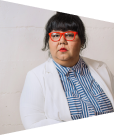Sustainability & Inclusivity
With a global revenue of 1.5 trillion USD, the fashion industry goes far beyond just clothes. Brands follow a purpose and value. This needs to relate to the consumer to create a loyal consumer base. Many brands have been talking about sustainability and inclusivity. But how can brands align all these aspects? A brand’s social values and purpose must align with its business strategy. To understand this alignment, it is important to look at the industry’s issues. Let us understand how fashion goes beyond just clothing.
The contribution of 8-10% of the global carbon emissions is just one of the many industry issues. According to Business of Fashion, 42% of professionals say the industry does not prioritize diversity and inclusion. However, due to the demand for change, this is damaging to brands’ reputations. Younger generations are looking for inclusivity and sustainability throughout the supply chain. The US fashion market is merely made up 21% out of plus size, despite serving 70% of all women. Brands claim to be inclusive, yet more than 60% of women struggle to find clothing that fits. However, not only consumers are struggling. The workers in the industry – on both ends – receive poor treatment. Garment workers and models.
Most clothes are produced by workers in countries with limited or non-existent rights. They face exploitation and are taken advantage of. Their wages do not even cover the bare minimum living costs necessary for survival. Workers have to work 14 to 16 hours a week, 7 days a week. In 2012, the Rana Plaza collapsed. This led to 1134 fatalities and was easily preventable. Before the collapse, workers actually complained about deep cracks in the walls. Officials dismissed these complaints one day before the catastrophe. They endure verbal and physical abuse by their supervisors. They are also not allowed to take breaks or drink water if they fail to meet targets. Children also work in the garment industry to support their families. Nevertheless, through activists such as Brana Dane, such issues gain more attention. She even says that garment workers are not the only ones being abused in the industry.
Models have to maintain unrealistic body standards. Many agencies only sign models if they agree to lose weight, despite being thin. If a model fails to do that, their earnings may be withheld, or they can be dropped. Models are not covered by worker protection rights, which created many problems during the pandemic. There are many struggles models face, which are easily dismissed. However, it is clear that change in the industry is coming. Movements such as the MeToo movement generate attention to the industry’s issues. Nevertheless, anonymity is a must for models. Once they complain or speak up about working conditions, they are punished. Whether this includes withholding earnings or blacklisting the model, it affects their career tremendously.
However, agencies such as Models Trust are working toward this issue. Anonymous surveys give models a voice. Still, it is important to say that this voice must be available to everyone in the supply chain.
With the increasing awareness of the industry’s issues, activism has risen. Many individuals who experienced the abuse first-hand are speaking up. As mentioned before, there are organizations that help to spread the word. Not only that, but they also actually make a change. The Model Mafia works for a more equitable and sustainable industry. They proposed a bill in New York that would grant models more labor protections. Furthermore, the model mafia encouraged the Me-Too Movement. They also fought against the distribution of plastic bags within the industry. Models Trust helps models by creating data-driven surveys and reports. These reports help identify abuse in the industry without tainting models’ careers. Not only do they advocate for themselves, but for sustainability all through the supply chain. This includes garment workers and inclusivity. Inclusivity has also been an issue in the industry. Are brands really as sustainable as they claim?
As mentioned previously, models have to follow strict diets and maintain a certain weight. However, with the change in consumer behavior, the overall industry has been changing. Consumers no longer want unattainable beauty standards. They want diversity and relatable beauty standards. Are brands as inclusive as they claim to be? When asking Brana Dane and Hayley Segar, their answer was clear. Not many brands actually are as inclusive as they say they are. Plus-Size colleagues even revealed that the clothes they wore to shootings were cut up. This was because the brands did not actually produce the correct sizes. They ensured the clothes fit in the front but had been cut open in the back. This was not visible in the photos. Nevertheless, this aspect is about to change. There are many promising, actually inclusive brands, such as Onewith.
Onewith is an inclusive swimwear brand, founded by Hayley Segar. The influencer and business owner wanted to create swimwear that felt good. Her aim was to make it as flattering as her seamless underwear. Although it is in its beginning stages, the brand keeps its promises. The sizes range from XS to 3XL, with the aim to range even higher as the business expands. She wants to make everyone feel good, despite the clothing size. This is why her brand is as inclusive as it can be. Hayley Segar’s intention behind the brand shows the change that is coming in the industry. Nevertheless, many brands are using the term inclusive to follow a trend. It is important to support brands which are actually passionate about inclusivity. This way, change will happen sooner than everyone may think.
Brana Dane is a model, activist, and TV host. She has been featured in Vogue, Porter Edit, the Cut, Glamour, Refinery29 and many more. Dane uses her influence to do good. Her work with the Model Mafia, Lonely Whale, Rainforest Alliance, and the New York Governor’s Office drove change in the industry. Her participation in, and organization of protests during the New York Fashion Week have drawn even further attention to the issues she is trying to fight.
Hayley Segar is the founder of onewith, an innovative, patent-pending line of women’s swimwear. It is designed to feel and fit like seamless undergarments.
Virgie Tovar is a contributor to the plus-size market on Forbes.com. She is an author of You Have the Right to Remain Fat, The Self-Love Revolution and The Body Positive Journey. Virgie started the campaign #LoseHateNotWeight. She also received Yale’s Poyner Fellowshop in Journalism and is based in San Francisco, California.

Brana Dane is a model and activist who has been seen in Vogue, Porter Edit (cover story), the Cut, Glamour, Refinery29 and more. Not only is she known as a model with a large following, but also as an activist who uses her influence for good. In addition to keynote speaking for the NYC official Earth Day Rally in 2019, Brana has organized multiple protests including the NYFW climate rallies that went viral on social media. In fact, by thinking outside the box, she has created and participated in numerous successful campaigns in concert with the Freelancers Union, the Model Mafia, Lonely Whale, Rainforest Alliance, the NY Governor’s Office, Lower Drug Prices Now and many other prominent organizations. Notably, Brana has also been seen on TV as a host for the fashion program, FNL Network, truly immersing herself in the industry from all angles.

Brana Dane is a model and activist who has been seen in Vogue, Porter Edit (cover story), the Cut, Glamour, Refinery29 and more. Not only is she known as a model with a large following, but also as an activist who uses her influence for good. In addition to keynote speaking for the NYC official Earth Day Rally in 2019, Brana has organized multiple protests including the NYFW climate rallies that went viral on social media. In fact, by thinking outside the box, she has created and participated in numerous successful campaigns in concert with the Freelancers Union, the Model Mafia, Lonely Whale, Rainforest Alliance, the NY Governor’s Office, Lower Drug Prices Now and many other prominent organizations. Notably, Brana has also been seen on TV as a host for the fashion program, FNL Network, truly immersing herself in the industry from all angles.

Hayley Segar is the founder of onewith; an innovative, patent-pending line of women’s swimwear, designed to fit & feel like seamless undergarments

Hayley Segar is the founder of onewith; an innovative, patent-pending line of women’s swimwear, designed to fit & feel like seamless undergarments

Virgie Tovar is the author of You Have the Right to Remain Fat, The Self-Love Revolution: Radical Body Positivity for Girls of Color and The Body Positive Journal. She started the hashtag campaign #LoseHateNotWeight and is a contributor for Forbes.com, where she covers the plus-size market and how to end weight discrimination at work. Tovar has received Yale’s Poyner Fellowship in Journalism. She’s based in San Francisco, California. Follow her on instagram: @virgietovar.

Virgie Tovar is the author of You Have the Right to Remain Fat, The Self-Love Revolution: Radical Body Positivity for Girls of Color and The Body Positive Journal. She started the hashtag campaign #LoseHateNotWeight and is a contributor for Forbes.com, where she covers the plus-size market and how to end weight discrimination at work. Tovar has received Yale’s Poyner Fellowship in Journalism. She’s based in San Francisco, California. Follow her on instagram: @virgietovar.
The latest in fashion and innovation trends.
Receive amazing & timely content.
Your request has been received successfully
Join a community of visionary entrepreneurs, LEADERS and fashion designers who are redefining the industry